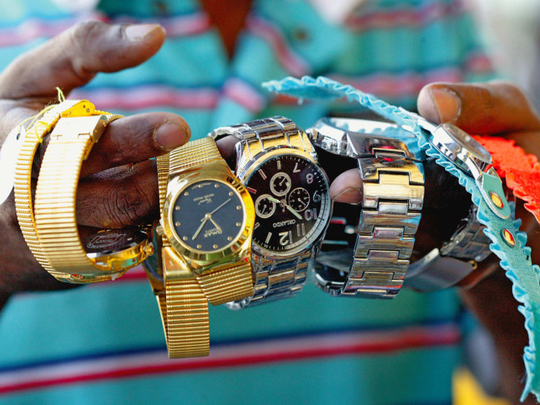
Dubai: Consumers can be major players in the fight against all sorts of counterfeit products, according to a Department of Economic Development (DED) official.
If people stopped buying fakes, there would be no lucrative business for counterfeiters, the official said.
Several raids took place between January and September 2016 that led to the seizure of 12 million counterfeit mobile phones and mobile accessories valued at more than Dh327.4 million.
Another raid in the same year led to the seizure of 5,000 counterfeit bags from a shop that was farming fish and shrimps in International City.
One of the main factors that motivates consumers to purchase fake products is their comparatively lower prices, along with the prospect of turning aspirational with the use of branded goods, even though they are well aware that fake products are of lower quality.
According to research, the purchase of counterfeit designer items sometimes helps certain individuals fit into their desired social circle or boosts their ego.
Many see purchasing counterfeit items as a harmless practice, not giving much thought to the impact the counterfeit industry has on a country’s economy or that it helps promote the wrong kind of business practices.
While not paying much attention to this reasoning is what prompts many people to buy fake or counterfeit hand bags, shoes, clothing items and other such external symbols of fashion, there is a host of other fake products, such as medicines, electrical equipment, cosmetics, etc, that actually pose safety and health risks to users.
What consumers say
Yousuf M., a Jordanian resident of Dubai, said that with his low salary, he will never be able to purchase luxury brands.
However, he said, “This doesn’t mean I cannot wear a similar design for a cheaper price.
“I don’t believe people will be able to differentiate between the fake designer shirt I purchased for Dh100 and a similar one available at the original store for Dh1,000. I just saved Dh900, so why not?” he said.
However, Yousuf is also not unaware of how purchasing counterfeit goods in the final analysis can be a bad decision. After all, he said, if he had enough money, he wouldn’t have considered purchasing fake items in the first place.
“From my experience with counterfeits, it’s not always a good deal, especially when it comes to fake sunglasses. The lenses hurt your eyes and so I wear them only when taking photos but never when driving,” he said. Basel K., 27-year-old bank employee, recalled the fact that when the iPhone 6 was launched two years ago, its price was beyond his budget. But since he wanted to own one, he decided to buy a fake one, which he realised was a wrong idea.
“When the phone was launched, the prices were unreasonably high, going up to Dh5,000. One of the shops I approached offered me a fake phone for Dh300 and I thought I would buy it just so I could show off to people.”
Basel said he later regretted his decision because the phone was not functional.
“It was heating up and it could have exploded in my hand. The operating system was slow and the camera was terrible,” he said.
Demand continues
In a similar vein, a 20-year-old Egyptian student said that seeing others flaunt original designer brands encouraged her to purchase fake designer bags.
“I found many websites selling the exact same design bags that many girls at my university owned, and I liked the way they looked. Since my parents won’t buy me the original item, I began ordering the counterfeit bags online for cheaper prices. My friends had no idea that the bags I bought were fake,” she said.
Antoinette Bashir, a housewife, said though she saves up money to buy genuine products as many times as she can afford to, she also likes to buy counterfeit designer watches.
“I do realise the impact that my purchases can have on the economy, but at the same time, as consumers, we don’t directly feel the impact on us and this probably explains why we continue purchasing counterfeit products.”
Other consumers said buying certain counterfeit products sometimes poses a risk to one’s health, which is why they choose to avoid the practice.
Marla Ebrahim, a digital designer, said, “Many fake beauty items like cosmetics and skin-care products are being sold online. The ingredients used in them can be harmful to consumers.
“Personally, I don’t go for fake cosmetics. Most of the time the labels on the product are in a different language and it’s hard to know what their formulations and ingredients are.”
Better to pay the full fare
Ali Zakarneh, an accountant, said buying counterfeit CD games and movies was something of the past. He said he would never buy counterfeit car parts like tyres only because they are cheaper.
“Fake tyres can explode and can cost you your life as well as pose a danger to other road users. Paying an extra thousand for an original tyre is a much better option.
“Fake consumer products like shampoos and creams are not tested for safety so I don’t think anyone should opt for such items.”












